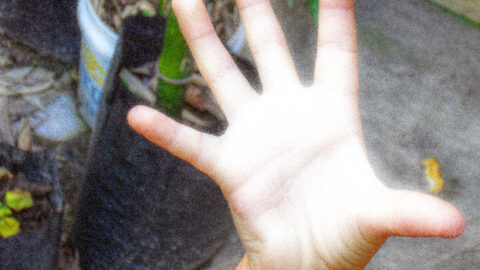I’m halfway through a three-week writing retreat at the foot of the Blue Ridge Mountains in Virginia, and what has occurred to me over and over is how little time I build writing into my daily life, how haphazard it is, an afterthought, something I too easily cast aside.
The Purpose of Subversive Writing, Or, The Pastor’s Wife Has Tattoos
Subversion has been on my mind for at least six months now. I like the way the word sounds when I say it out loud. It moves toward the front of my mouth, over my tongue and lips, rolls back toward my throat, and finally lands on the tip of my tongue at the end of the last syllable.
As the word “subversion” rolls around the mouth, it’s also a word, in action, that deconstructs and challenges. It’s a hard-working word, frightening to those who hold power. The word comes from the Latin subertere, meaning “to overthrow.” I love the definition of the word: “An attempt to transform established social order and its structures of power, authority, and hierarchy.”
Getting Lost
I’ve been getting lost lately. I’m forty now; getting mixed up and turned around isn’t a problem I recall having as a twenty-something. It began one day in my late thirties when I went for a walk by myself in the subdivision where my brother lives with his family. Only the day before, I’d gone for a run with my seven-year-old niece, who rode her bike. She suggested we head to the back side of the subdivision, where I’d never been before. She was confident we wouldn’t get lost. I followed her, and as she promised, we made it safely back without incident. I thought I’d paid attention to the path she took.
My Murderous Heart
Last year, I wrote a confessional essay in honor of the 2015 Lenten season about a time I nearly killed my ex-husband. It was recently published in The Cresset. Several of my friends read it, discovering that, at one time, I’d had a murderous heart. You never know, of course, if anyone will read your work or if it will go unnoticed. I had hoped for oblivion for this one mainly because it was difficult to know how friends and colleagues would react. I do a tolerable job of helping others think I’m homespun, normal—I think we all do this. It helps us gloss over the messiness of life and makes day-to-day interactions easier.
We Are Made of Words
When I think of words, I imagine a terrain and see myself as an amateur geologist of sorts. The words are stones, shaped by the passage of time, by the elements. I pick one up and examine it to get a feel for its weight, shape, edges, size and proportion to others. I hold it up to the light to get a sense of its tint and hue, trying to decide what new dimension it will add to my collection. I recognize it as a weapon, a fragment of a puzzle, as evidence. As building material.
I celebrated my fortieth birthday a few weeks ago, and received a gift, the very best gift: Words. They came in the form of short, personal notes from several of my students (I teach at a small college in northern Indiana). They wished me a happy day and encouraged me by explaining their experiences in my classrooms. I don’t know who organized such a thing. I didn’t tell anyone beforehand that it was my birthday (though, on the day, it splashed across Facebook). Someone anonymously delivered the notes to my office. It was hush-hush, a surprise. By the time I finished reading, I was in tears.
What Doesn’t Kill You Makes Someone Else Stronger
Heather Kirn Lanier: A Poet Obsessed
 Heather Kirn Lanier’s poetry chapbook, Heart-Shaped Bed in Hiroshima, a finalist for the 2014 Gloria E. Anzaldúa Poetry Prize, reflects an obsession. But it should not surprise us that most of her work does this. Like many writers, she finds she must follow her obsessions wherever they lead.
Heather Kirn Lanier’s poetry chapbook, Heart-Shaped Bed in Hiroshima, a finalist for the 2014 Gloria E. Anzaldúa Poetry Prize, reflects an obsession. But it should not surprise us that most of her work does this. Like many writers, she finds she must follow her obsessions wherever they lead.
“The collection is about trying to understand the brutalities of war through mediated forms—memorials, museums, news headlines, biographers. It’s about trying to bridge the chasm between the citizen and the far-away war her country is waging. It’s about feeling responsible to bridge that gap, even while it’s ultimately impossible,” says Lanier.
The Memoir Writer Under Interrogation
I like watching true-life whodunnits. I’m particularly fond of NBC’s Dateline. It’s my secret lowbrow television pleasure (along with Say Yes to the Dress, but that’s for another post). In general I like hearing other people’s stories. But with true-life crime you spend an hour learning about a bizarre, hideous murder of an often unusually endearing person in some part of the country very far from where you live. I guess the secret dirty pleasure part comes in because watching true-life murder mysteries are a sort of cathartic experience: my life isn’t as bad as that person’s. At least someone didn’t kill me. Nor have I been accused of murder.
The part of the show that most piques my interest happens when police investigators haul the suspect into the interrogation room. The scenes are high anxiety as investigators try to buddy up with the suspect and get definitive proof while the suspect tries to evade the truth and not give herself away. Secret camera video footage often captures a person out-of-sorts, divided between herself and what she’s done. I can relate.
The Writer’s Enemy
Social media is to the working writer as is a ball to the puppy in obedience training. Set it in front of her and curiosity often wins, unless the reward for ignoring it far outweighs the rewards of chasing it. In the writer’s case, when that little red Facebook notification pings, it is nearly impossible to avoid diddling away an hour by scrolling and posting and liking and commenting. Or, I’ve found that to be true for me at least.
In my own behavior regarding social media, I’ve noticed a near constant need while at the keyboard to check for notifications, scroll, and generate pithy status updates. I’ve noticed it in others, too. Writer after writer—my friends—comment about the distractions that prevent them from making progress on their writing projects. As it turns out, the rewards—hearing the sound of the ping and seeing the little red number in the top right of my Facebook page—are precisely what make social media so insidious. Thanks to our biology, the pleasures of publishing can hardly compete.
A Writer’s Confession
I don’t believe in writer’s block. If I can’t write, I go out and live. Then, if I’m a writer, I’ll find something to write.” –Peter Arpesella
Confession: as someone who writes memoir, I often get sick of myself. For several years I’ve been working on the same project—growing up in poverty with a closeted homosexual single mother—first as a graduate student in an MFA program and now as a writing professor at a small liberal arts college, where tenure in part depends on publication. I’m on the third and, hopefully, final draft.
This summer, I spent my break rearranging, rewriting, and recreating. By the end I was saturated once again with the sticky, cloying oil of my past. It coated everything. Every time I licked my lips, I tasted it. Every time I sat with my laptop to write, I smelled it, scorched and dark. My skin was thick with it, my vision blurred; sounds were distorted. Immersed in that world for months at a time, my sense of who I am now—writer, wife, teacher—begins to waver as though my adult self were only a mirage shimmering in the foreground of my past. That’s when the words get stopped up and I don’t want to write. Often, I take a vacation from myself, from writing.











